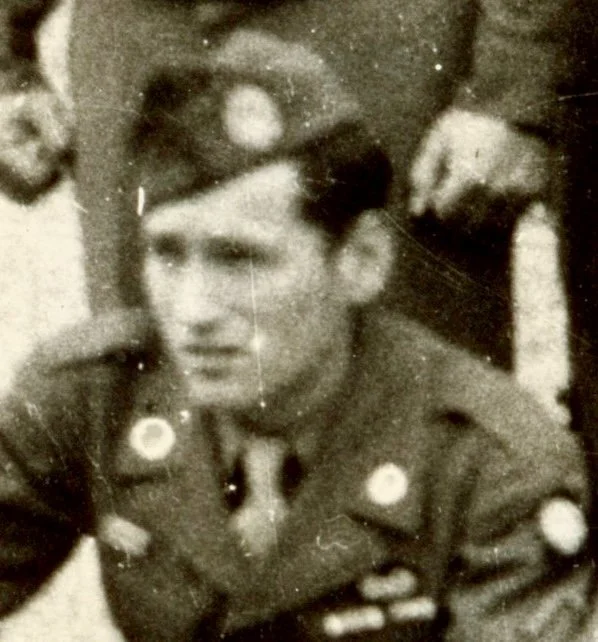William Forsyth
ASN:12204303
Pfc William Forsyth
William Henry Forsyth registered for the draft on June 30, 1942. Born February 12, 1922, he was from Union City, New Jersey. Unemployed at the time of his registration, this twenty-year-old was 5-8, 130 pounds with a light complexion, blue eyes, brown hair, and no other obvious physical characteristics.
Enlisted in the Army on December 10, 1942, PVT Forsyth received his training at Fort Bragg, North Carolina. He was assigned to the Medical Attachment and later transferred to A-Battery, 319th Field Artillery Group, 82nd Airborne Division.
Along with fellow Glidermen, PVT Forsyth traveled to North Africa in May 1943. Later promoted in rank to Private First Class, he fought in six (6) battles and campaigns; Sicilian, Naples-Foggia, Normandy, Northern France, Ardennes, Rhineland, and Central Europe.
“Company Morning Reports” (CMR) were produced every morning by the individual Army units to record personnel matters. The following events (see below) were reported for PVT Forsyth:
January 19, 1944, listed as assigned to sick quarters for a foot injury and released on January 23, 1944, to duty.
February 21, 1944, PVT Forsyth was confined to the camp guard house. He was released from confinement at the camp guard house on March 26, 1944, and assigned to duty.
June 15, 1944, PVT Forsyth was reported missing in action effective June 6, 1944.
June 18, 1944, his status as changed from missing in action to slightly injured in action. He returned to duty on June 25, 1944, after being listed as absent due to battle casualty.
July 18, 1944, PVT Forsyth was reassigned from the medical detachment to A-Battery duty, MOS 521 (basic soldier).
July 25, 1944, he was given furlough for five days to Birmingham, England returning on July 30, 1944, to duty.
On January 9, 1945, Forsyth was promoted from Private to Private First Class.
Company Morning Reports
PFC Forsyth was a valued member of the A-Battery. Prior to the Normandy campaign he was assigned to the 319th’s medical detachment. While the 319th was stationed in Ballyscullion, Northern Ireland, January 1944, he was hospitalized for cellulitis of the foot/heel, an injury prevalent under combat conditions.
Prior to the Normandy invasion the 319th was bivouacked at Papillon Hall, Market Harborough, England. PFC Forsyth seen below posing for a photo opportunity.
William Forsyth (L) and George Johnson - Spring 1944
He was listed as missing in action on D-Day, June 6, 1944, during the 319th’s glider landing near Sainte-Mère-Église, France, later hospitalized with a chest injury.
After his hospitalization PFC Forsyth transferred to A-Battery, (MOS 238, Lineman/Repair telephone - telegraph) where he fought for the duration of the war.
On April 16, 1945, the 319th was stationed in Hurth, Germany and the German Army had all but formally surrendered. To celebrate, a private banquet (see below) was given to the A-Battery enlisted men. The officers and top NCOs would serve the troops a menu featuring “roast” chicken, assorted side dishes and cans of GI beer. Even though it was exclusively an A-Battery function, Colonel Todd, Major Silvey, and Major Wimberley were invited and took their seats with the men. The dinner program (see below with group photo) featured some fun theatrical skits by the enlisted men. PFC Forsyth acted out a humorous scene in “ACT II,” alongside T5 SGT Harold Walz.
Aside from the amenities, something more singular was in the air that night. It was hard to avoid thinking back to all the events since landing at Casablanca. Now being here, together in Germany, participating in what were clearly the closing acts of the war imbued the occasion with extra meaning. The gesture of appreciation by the officers toward the rank and file seemed to say, “Thanks guys, we couldn’t have done it without you,” in a voice that was loud and clear.


PFC Forsyth appeared in a A-Battery photograph (see inset) taken in June 1945, Epinal, France, with other enlisted men. Standing (L-R) Tom Ludwick, Orin Miller, Lloyd Cattell, Roland Gruebling; bottom row (L-R) William Forsyth, Frederick Von Hassel and Thurman King.
PFC Forsyth also appeared in the A-Battery group photo taken June 20, 1945, in Epinal, France. (see below)
The Adjusted Service Rating Score (ASR) was a system the US Army used at the end of the war to determine when soldiers were eligible for discharge. PFC Forsyth was one of many “High Point” soldiers with a score over 85 points who returned to the USA arriving in Boston, Massachusetts and civilian life, September 14, 1945.
PFC Forsyth was awarded 6 Bronze Battle Stars, Bronze Arrowhead, Good Conduct Medal, the Belgian Fourragere, Presidential Unit Citation Badge, Victory Ribbon, Glider Badge, Purple Heart and the European-African-Middle Eastern Theatre Ribbon.
William Henry Forsyth, 90, died January 20, 2013.
God bless this hero.













